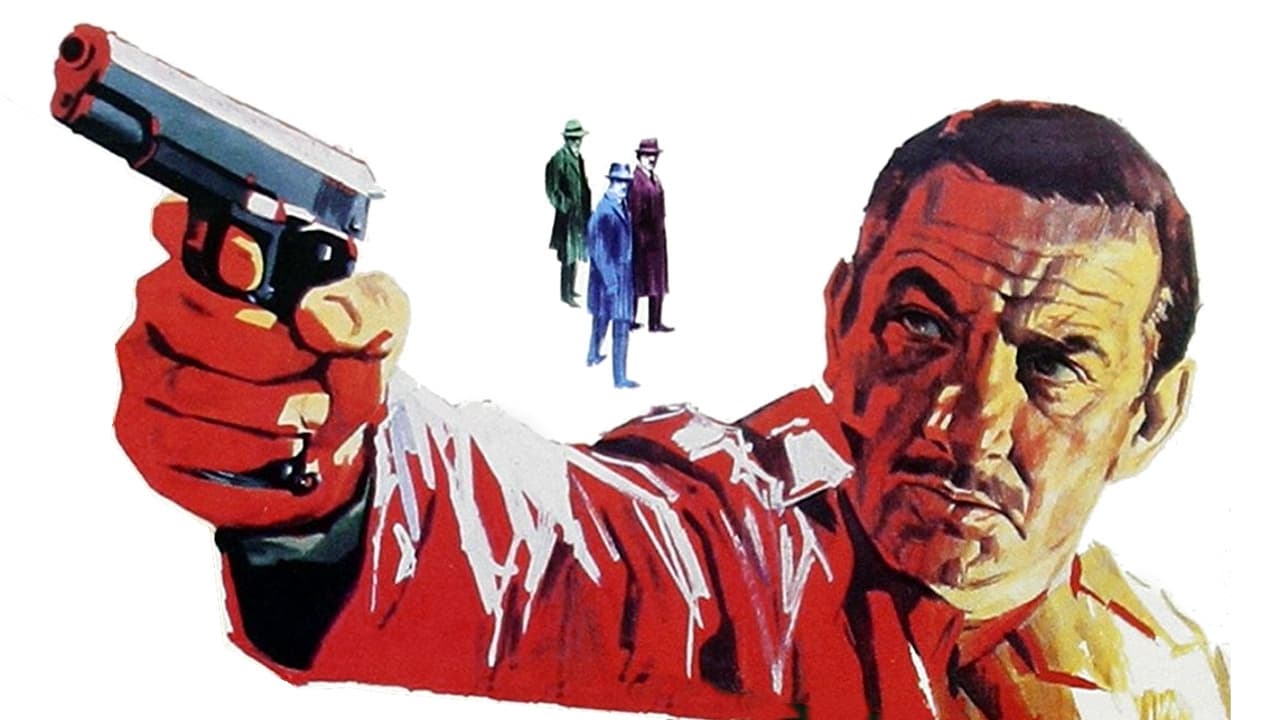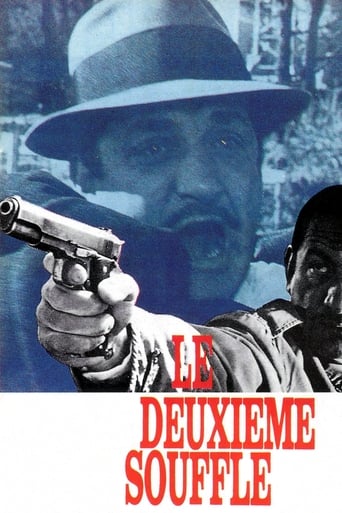

This movie is the proof that the world is becoming a sick and dumb place
... View Morejust watch it!
... View MoreA Masterpiece!
... View MoreThe story, direction, characters, and writing/dialogue is akin to taking a tranquilizer shot to the neck, but everything else was so well done.
... View MoreJean-Pierre Melville and his long standing infatuation with Hollywood "Film Noir",which he was the most devoted follower of, in entire history of French cinema, produced the whole line of best French crime pictures ever. In this one, he's in absolute top form on this neatly constructed, no nonsense caper film. Building a story of old school criminals with sense of criminal honesty and honor, around 800 million heist, Melville, tells many stories, from human relations, betrayals and greed, to love and friendship that will go all the way.The dialogs are great. Witty police inspector Comissaire Blot, beautifully portrayed by Paul Meurisse and Lino Ventura's Gustave "Gu" Minda,play the game of cat and mouse with no unnecessary talk, and no unnecessary action. Melville devoted a lot of attention to detail, and this film deservedly looks like a crime-action documentary, with no plot holes or "how the hell this or that could have happened" types of questions for the viewer, which is very important for mature audiences that appreciate classic films. I think that this may be the best film Melville made in the 60's, even better than "Army of Shadows" or the "Samourai",and was the last he made in his own studio that burned up during the production of "Samourai" in 1967, which may explain the possibilities he had, to devote time and attention to details. If you appreciate a good crime picture, be sure not to miss it.
... View MoreWhy do I always care about thieves in heist films, no matter how bad they are? As is common in Jean-Pierre Melville's later films, this meticulously crafted crime film opens with a title card that epigrammatically sets out a foreboding epigram that molds ostensible meaning into the action: "A man is given but one right at birth: to choose his own death. But if he chooses because he's weary of his own life, then his entire existence has been without meaning." It's invariably inhibiting to totally apply these fatalistic, existential aphorisms to the films that thus proceed, but they tend to cast a distinct outlook across the film. I'm not so sure that this slow, deliberate caper, or any of Melville's others for that matter, seeks all of the indications of this quote, but its pretext of fate, mortality and grim, solipsistic judgment corresponds with the essential themes of the film.Like Le Cercle Rouge, Le Deuxième Soufflé is a nominal saga, an antithetical and composite film in which the life seems as if to impose and simultaneously exhale. Ventura's performance is both innate and disciplined by his claustrophobic settings. There are several instances set within moving cars, less to expand the atmosphere than to show the inhibition of the space they employ.What frustrates and somewhat detaches me however is that Melville never seems to give his characters any involved cognitive measure. They're characterized and assessed by the black and white of their behavior. Gu is a ruthless, intractable and curtailed presence who gains recognition, even from Inspector Blot, another wonderfully named character, played by Paul Meurisse, who respects his deadly actions because he eventually complies with and doesn't veer from his dang "code."Much of this 1966 cops-and-robbers film can be explained just in terms of its distilled preoccupation with the reference to the conventions regarding the treatment of Chandler, McBain, W.R. Burnett, Jim Thompson, stylish Hollywood crime dramas, and classic American gangster pictures. Melville's films in this mode have the element of photogenics, conformity to modern ideas and models nourished by a shadowy nonchalance and the characters' affectedly memorialized mannerisms. For instance when a dutiful thug prepares to meet the other gang members, casing the place first, but also anticipating the blanket preconditions of the scene. This dogmatic behavior underscores the salutary definitions of these characters, their movements having a textbook role. You can also see Melville's influence on Tarantino's Jackie Brown when the thug is dramatically pre-performing the differing poses of the impending standoff. Also, it's not until Gu changes into clothing more mindfully echoing that of a gangster that he is allowed to free himself from being so secretive and concealed.The sullen, inflamed and exceedingly conventionalized quality of this typified film conveys Melville's immersion in the downbeat deliberation of the play of loyalty and destined disloyalty. With this transcendent crime film, as per Melville's usual, complete with another great title, Second Wind, Melville pushes the tonal qualities and gray scale of the image to new levels. The movie's preoccupation with issues of fellowship, abnormally all-consuming professionalism, silence, and duplicity reverberates with Melville's own distinction as an egocentric, tight-lipped, fringe-dwelling figure in French cinema, who despite his success never truly declared participation or involvement in any founded generation or evolution of filmmakers.
... View More"Le Deuxième Soufflé" is an excellent crime film--mostly because it emphasizes realism as opposed to sensationalism. Now this isn't to say the film isn't exciting, but it certainly is one that has a much slower pace than usual and excessive attention is paid to the details--so much that you'd swear this is almost a crime documentary instead of fiction.The film begins with a daring breakout from prison. Gustave 'Gu' Minda is lucky and makes it over the wall safely. It turns out he was #1 on France's most wanted list ten years earlier and so naturally it makes quite a sensation when he escapes. The first half of the movie have a lot to do with his escape and his life in hiding. However, despite hiding, he does have a few adventures along the way that I won't elaborate on because it would spoil the suspense.A bit later, while waiting for a way out of the country, Gu is a bit bored and jumps at a chance to pull one last job--a very, very BIG job where 800,000,000 francs worth of platinum is on the line. Once the job has been completed, though, the film is far from over and the police naturally are combing the country for Gu and the money--though they really don't know if he had anything to do with it or who his accomplices are.Now there is one minor detail about the film I didn't like. While Gu has changed his appearance and relocated from Paris to Marseilles, he sure seemed pretty out of character late in the film. Despite being such a brilliant and careful prisoner, he takes walks about the city! Why? Well, I have no idea and it's not surprising that he's finally caught. However, once again, there is much more to this 150 minute film--a lot of twists and turns that occur because Gu, though generally amoral, will do anything to convince his fellow criminals that he has a strong sense of honor and integrity. I liked this because it did give him some depth and the finale was indeed exciting.The film is very much like a French version of Film Noir. In general, the French did their Noir a bit later than Hollywood and this continued through the 1960s--after Hollywood had gone on to other things. Making this film in black and white was a great choice, as it heightened the Noir look and it as well as "Bob le Flambeur" and "Le Samourai" are among the best in this French genre. Not to be missed.
... View MoreI saw this at London's National Film Theatre last night and I must admit to being more than a little bit disappointed. This appears to mark the turning point where Melville lost all real interest in character (after the wonderful Le Doulos and the underrated L'Aine Des Ferchaux) and turned his attention to set piece robberies and shoot outs. The problem is, that this is still a long and wordy script, with an awful lot of very pointless talk, connecting up some visually excellent scenes. The highlight of the film, the hijack of an armoured car on a deserted mountain road, foreshadows the action techniques -shaky camerawork, fast cutting - used by Ridley Scott in Black Hawk Down, Gladiator and Hannibal; unfortunately it's over in seconds. There are other great scenes, but dramatically they lead nowhere. For example, one gangster scouts the site of an intended meeting, works out where he might be standing when there's trouble, and hides a gun nearby. When he leaves, an adversary comes into the room, goes through the same thought processes, and finds and removes the gun. But the scene never pays off, as the first gangster never ends up reaching for the missing weapon. Performance wise two people stand out - Paul Meurisse as the compassionate, intelligent and very, very funny Inspector Blot, and Pierre Zimmer as Orloff, the gangster who serves as the moral touchstone for his peers.About three quarters of the way through the film turns from an escaped convict and heist movie into the story of a man trying to prove that he hasn't been a police informer/collaborator. As with a lot of Melville's gangster vs police movies (a big favourite with the French) you can't help feeling that he's really dealing with the issue of wartime resistance to the German occupation. To my mind, though, Melville seems more interested in shoring up the myth of resistance rather than dealing with the truth (as Louis Malle tried to in Lacombe, Lucien, resulting in his effective exile from France for the rest of his life).The scene where Paul is interrogated by the police was apparently edited at the insistence of France's censors to remove the scenes of water being poured down his throat. What remains is a very obviously edited scene which doesn't work.Anyway, not an awful movie, but a messy one. Can't help feeling that maybe Melville got interested in something else and couldn't be bothered to finish it properly.Fell asleep twice.
... View More